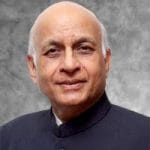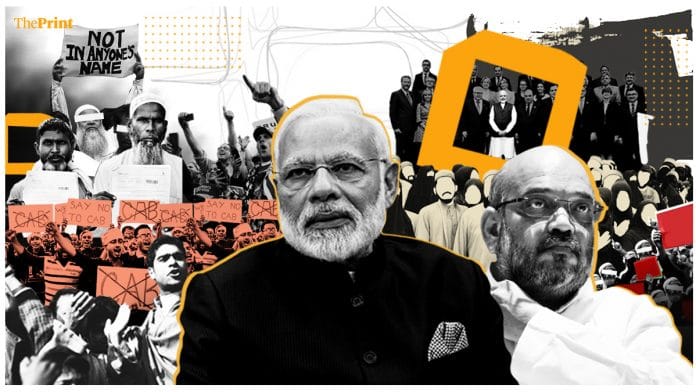Japanese Prime Minister Shinzo Abe postponed his visit to India amid protests in Assam over the passage of the new citizenship law. This comes a day after Bangladesh Foreign Minister A.K. Abdul Momen and Home Minister Asaduzzaman Khan cancelled their visit. India’s External Affairs Ministry said it was “unwarranted” to link Momen’s cancellation with the citizenship law. UN human rights mechanisms have already reportedly expressed “their concerns about the nature of this law.”
ThePrint asks: CAB, NRC, Kashmir: Is Modi govt damaging India’s diplomatic standing for domestic politics?
Foreign policy not free of domestic politics. Citizenship, Kashmir are India’s internal matter but affect Pakistan, Bangladesh
 Kanwal Sibal
Kanwal Sibal
Executive council member, VIF, and former foreign secretary
Foreign policy cannot be autonomous from domestic politics altogether, especially in a democracy like India.
All the three burning issues – citizenship law, NRC and Kashmir — are India’s internal matters. Both the Lok Sabha and the Rajya Sabha (where the Narendra Modi government lacked majority but eventually got the support of other parties) have approved the Citizenship (Amendment) Bill and constitutional changes in Jammu and Kashmir after transparent, though heated, debates. The Supreme Court has been monitoring the NRC process in Assam and will also hear petitions on Kashmir and the citizenship law in time.
These three issues, however, also involve Bangladesh and Pakistan principally. Illegal migration from Bangladesh is a reality that had to be addressed. The cut-off date in the citizenship law and the Modi government’s acknowledgment of the absence of persecution of minorities under the Hasina government — should satisfy Dhaka.
Pakistan’s jihadi policies towards India and its refusal to give citizenship to Biharis of erstwhile East Pakistan and Afghan refugees make its utterances hypocritical and irrelevant. For Pakistan and Bangladesh to express concerns about India’s secularism is dishonesty.
In the context of India’s diplomatic standing, is it worried about the US and Europe? Actually, US domestic politics is vitiating its foreign policy. With growing anti-immigration and anti-Muslim sentiments in Europe and its own citizens who joined the Islamic State prevented from returning, Europe is answerable itself.
Citizenship law and NRC issue can strain India’s ties with its most important neighbour — Bangladesh
 Pranay Kotasthane
Pranay Kotasthane
Head of Research, Takshashila Institution
‘Neighbourhood first’ was supposed to be the guiding principle of Modi government’s foreign policy. But all three measures — the new citizenship law, NRC and Kashmir issue — are examples of policy actions that are likely to have adverse outcomes for India’s interests in the region.
The amended citizenship law and the NRC issue will put strains on India’s relations with its most important neighbour in the Indian subcontinent — Bangladesh. In 2018, Bangladesh emerged as India’s largest export market for Indian-made two-wheelers. Bangladesh has also surpassed Pakistan in terms of GDP per capita. The 2011 census data shows that illegal migration from there is reducing and is not a problem of the present. Most importantly, the Sheikh Hasina government is one of the few steadfast pro-India formations in the neighbourhood. Unfortunately, the signal being sent to other leaders in the region is that taking pro-India positions might turn out to be a loss-making proposition.
In the case of Kashmir, Pakistan will try to use the Article 370 issue to drive a wedge between the US and India. From Pakistan’s standpoint, returning to the India-Pakistan hyphenation era in the eyes of the US is desirable. From India’s viewpoint, the more Pakistan features in India’s foreign policy outlook, the less energy it has for confronting the more significant global challenges.
India being unfair to neighbours by questioning their record on minorities, who are living their willingly
 Talmiz Ahmad
Talmiz Ahmad
Former Indian ambassador to Saudi Arabia
While defending the citizenship bill in Parliament, Home Minister Amit Shah made a number of observations and comments about India’s three neighbouring countries: Bangladesh, Pakistan and Afghanistan. When you bring three neighbouring countries into domestic politics, the issue ceases to be purely a domestic one. Making negative remarks on these countries will obviously generate resentment.
India has been unfair to its neighbours. It may be concerned about illegal immigrants, but to criticise other countries on their treatment of minorities will be seen by them as an intrusion into their domestic affairs. Most countries in South Asia are pluralistic societies, accommodating a wide variety of communities pursuing different religions and ethnicities.
Bangladesh has a large number of non-Muslims, and many of them have chosen to be Bangladeshi nationals. Criticism in the case of Afghanistan is also unfair. The Sikh community has been living there since centuries. The war-torn country is trying to heal itself and the last thing it needs is another country pouring scorn over it on the issue of religious persecution.
Pakistan also has a substantial number of minorities. These have deliberately chosen to live there and are attempting to be exemplary citizens.
I don’t think India’s criticism is likely to be well-received. Moreover, all countries are vulnerable to criticism by others. India’s social fabric is also under stress and has been questioned. Countries should instead support each other in upholding the multicultural order.
For officials of other countries to use citizenship law to cancel visits or express displeasure is not expected

Lalit Mansingh
Former foreign secretary
The amended citizenship law is a piece of domestic legislation. It has been passed by the India Parliament. For officials of another country to use this as a reason for either cancelling their visit or showing displeasure is not expected. At the same time, I don’t think India has taken the trouble to brief Bangladesh on the ramifications of this law. Bangladesh must be explained that India’s citizenship law will not affect people of other countries except those who have illegally come to India.
India allows the people of Nepal and Bhutan free access to enter as long as they stay here legally. India should actually be considered as an example for countries to follow.
But the Modi government could have taken greater care in handling the situation. The comments made against our friendly neighbouring countries were irresponsible. For instance, Amit Shah referring to Bangladeshi refugees as “termites” is not acceptable. Passing disparaging remarks about people from a certain country is not how diplomacy is conducted. This may hurt the self-image of that particular country.
This is just a temporary setback and can be explained. India should take care to not alienate someone as sympathetic as Sheikh Hasina. I am optimistic that the citizenship law will not be a factor in the deterioration of India’s ties with its neighbours.
Also read: Hindus in Bangladesh don’t face a situation as dire as I do: Taslima Nasreen
By Kairvy Grewal, journalist at ThePrint







Is not “othering” of minorities persecution? Is not mob lynching and killing in the name of the cow and beef persecution? Muslims of India remained in India as the Congress party , which fought for freedom under enlightened leadership, refused to have an India on the basis of religion, while Pakistan got created as a state for Muslims, though Jinnah made a grand announcement that in Pakistan all citizens irrespective their religious denomination would be treated alike without any discrimination only for leaders subsequent to Jinnah reneging on Jinnah’s promise . When Shah said in parliament that the Congress partitioned the country , he was either not speaking the truth or is not well informed or was trying to hoodwink the ignoramus . CAA is simply not a domestic matter for foreign countries to ignore . There are ways in which the refugees could have been given citizenship without violating either the constitution or the laws of the land . After all, the government can decide as to who can be given citizenship . The CAA was essentially to further polarize masses along religious lines and threaten the Muslim minority to fall in line and has little in principle except the principle of communalization of the masses
A country ranked 132 out of 190 or so countries has really no diplomatic standings to influence any one. It may perhaps have diplomatic rights on trivial matters. Might is right in this world. Rich is admired while the poor is looked down. where did this Indian delusion of right, respect et al come from.?Being polite is a form of diplomacy, Misunderstanding these as respect is silly and childish.
Modi ji , A history maker. A Flambouyant Determiner. A Living Legend . Who has made our beloved nation India which is Bharat,burn to rubble. His charismatic personality and magical wits has made our beloved nation bleed to death.
In todays India every aspect of Life , which is guaranteed to it citizens are falling like stack of cards one after another. Issues that needs to be tackled immediately are being kept aside and non issues are given much more coverage than required. No wonder how India will rebuild it self after this Wonderful leader leaves his Supremacy.
There is a great merit in points raised by Kanwal Sibal and Lalit Mansingh, both accomplished foreign office veterans.
Those who state “Domestic political differences were rarely aired on foreign soil.” conveniently ignore that India’s current opposition does not have a very stellar record in aligning with personalities and voices that speak on India’s internal affairs. Just examples: Mani Iyer in Pakistan and Congress overseas cell meeting with Corbyn should be enough to shut them up. Unfortunately this forum does NOT offer enough scope for countering their flawed arguments.
What a shit of article, Our internal isues of this dimension can not be diluted to diplomatic norms or to satsfy Pakistan . Print stop these type of artcles and come back to real issue of ours
CAB is Modi’s greatest blunder after demonetization.
Difficult to make sense of the abrogation of Article 370 either. Ms Vijaita Singh reports that MHA is holding consultations with the UTs of J & K and Ladakh to give them special protections under Article 371. So perhaps the earlier decision was not such a historic blunder after all. One is unable to divine how effectively the permanent civil service is able to advise on issues of such great import.
But why does the Modi government now wants to give J& K special status under the Article 371, after cancelling it by abrogating the Article 370 0n 5 August last? What happened to “one country, one law, equal rights for all”, “full integration into India”, etc? The reason seems to be that, the “outsiders” can’t buy property in those Northeastern states where they have the special status guaranteed by the Article 371. These states wouldn’t let go of the special status given to them by the Article 371! What was the government to do? If it allows these states to retain the Article 371, then J&K would also demand that the Article 370 giving them the similar special status be restored! The government can’t discriminate between the states by allowing some to keep their special status, while cancelling the same of some other state! So now the government wants to correct its own mistake by offering J&K the special status under Article 371, only 5 months after cancelling its special status under Article 370! Then remains the question of statehood of J&K!
There needs to be a firewall between electoral politics and foreign policy, which is almost entirely about India’s long term strategic and economic interests, which change over time but can span several administrations. For as long as one can remember, foreign policy used to be an almost entirely bipartisan affair. Domestic political differences were rarely aired on foreign soil. The diaspora was admired for its economic success and the contribution it made to improving a India’s global image, but it was never weaponised to serve instructions issued from Delhi. We did not take sides in political contestation abroad, get identified with Republicans or Conservatives. Lots of crossing of wires is taking place. Fortunately we have an EAM who has been India’s longest serving FS. He is uniquely placed to map out the minefields that we should be walking over more carefully.